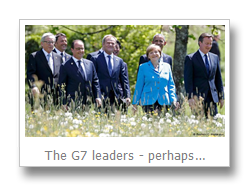The G7 leaders met Monday in Germany to discuss a number of issues, but the one of interest to us is climate change. Not in and of itself, but in terms of what pledges the leaders made to address the threat.
The G7 also reaffirmed the goal of limiting global warming in the 21st century to 2 degrees Celsius from pre-industrial levels, first agreed at a 2009 UN climate summit in Copenhagen.
"Urgent and concrete action is needed to address climate change," the G7 leaders said in a final statement after a two-day summit in Germany.
And that’s not all.
First, a deep cut in carbon emissions by 2050 and second, an eventual end to fossil fuel use by 2100.
That’s startling. Saying things is easy, especially if you can slow walk it over 85 years. How to do it is the hard part. We can think of a very helpful way, but why not let the G7 have a go at it.
Several environmental groups praised the G7 countries for declaring war on carbon, which, they say, will surely lead to a rise in renewable energy. But the G7 never actually said that renewables will be the energy source of the future. They only mentioned the need for carbon-free energy. In effect, the group of countries left the door open to nuclear energy.
Nuclear power has been praised as a climate change fighter because of its reliability and near-zero emissions. Nuclear power already provides 11 per cent of the world's electricity, according to the World Nuclear Association.
Last year’s G7 meeting was considerably more explicit about nuclear energy.
The statement said, "We intend to promote the use of low-carbon technologies," which were defined as "renewables, nuclear in the countries which opt to use it, and carbon capture and storage."
Six of the G7 are nuclear energy states (Germany until 2022, and we’ll see about that), with only Italy excluded. And Italy still imports about 10 percent of its electricity from nuclear sources. (And large non-G7 states such as Russia, China and India are also major nuclear energy states).
It’s somewhat ironic but not in the least unexpected that Germany is all in on this plan but will be in major trouble after 2022, when it shuts down its last nuclear plants. Of the western European countries, Germany will be the least able to meet its emissions targets – and that’s before rules come out of this meeting that are more stringent than what the European Union has set.
But the reality is Germany has always been given an undeserved free pass on the issue of its own greenhouse gas emissions linked to climate change.
That’s because it is falsely held up by environmentalists as a model of green propriety, since it gets up to 30% of its electricity from renewable energy sources.
But all that does is mask Germany’s dirty little secret.
That is that it gets far more of its electricity, 45%, by burning coal, the dirtiest fossil fuel.
This is from a Canadian source and boy, are the Canadians mad at Germany right now. See the full editorial for more.
As far as the U.S. is concerned, this is as strong an argument for ensuring the final EPA rule on power plant emissions correctly values nuclear energy. Since nuclear energy is the largest source of carbon-free electricity in America (not to mention in most of the countries that use nuclear), any rulemaking dedicated to reducing carbon emissions must preserve existing nuclear generating capacity, provide an incentive for new nuclear power plant construction, and certainly must not create disincentives for new nuclear generating capacity. That just makes sense generally, but has now been given special urgency after the seriously ratcheted-up goals agreed to by the G7.
We’d call this a no-brainer, and it’s fair to say that the role of nuclear energy in any carbon emission reduction regime is well-recognized – at least rhetorically. Now is the time to follow rhetoric with action.

Comments
James Greenidge
Queens NY